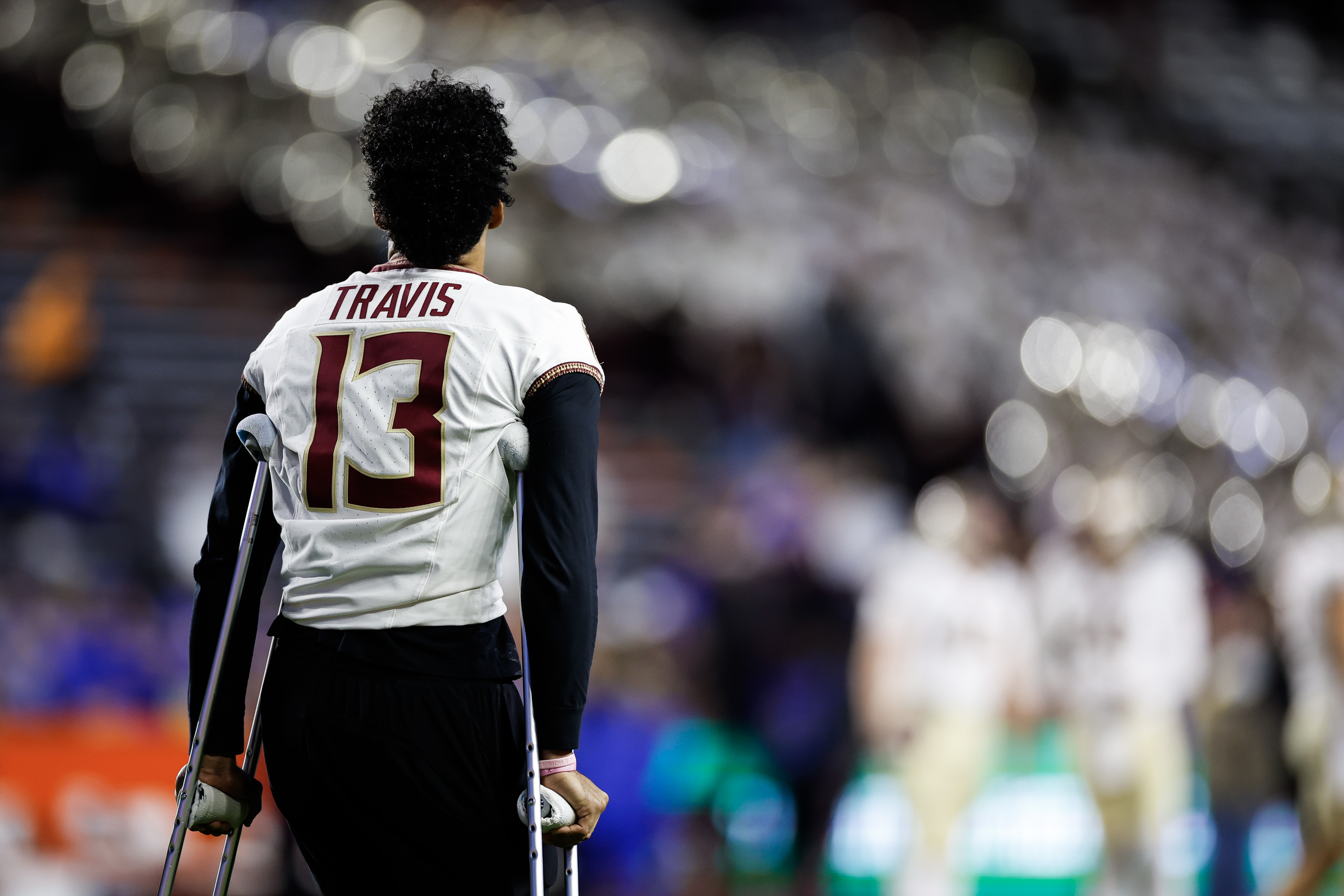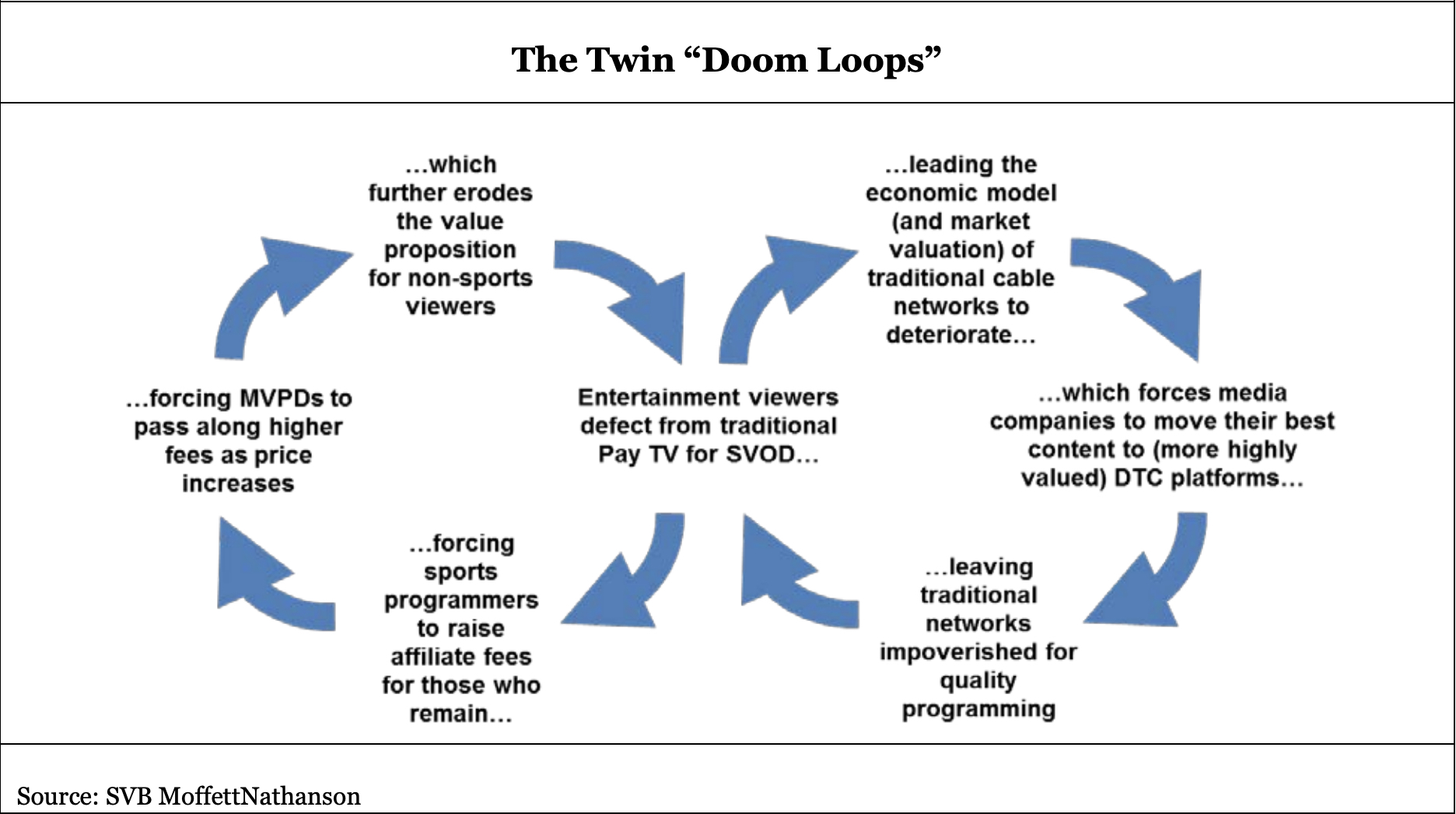One of These Things Is Not Like the Other: Was Florida State's Perfect 13-0 Record Sacked By the SEC's $3 Billion TV Deal With Disney/ESPN?
In our latest 'Next Text,' we ponder college football's playoff travesty, retrans' ratcheted-up rhetoric, Disney's Culture War floggings and a bunch of other stuff that's unfair and just not right

The smarter way to stay on top of the streaming and OTT industry. Sign up below.
You are now subscribed
Your newsletter sign-up was successful
Welcome to Next TV. How can we deliver you excellent service today? You say you want a column with the editors kind of rambling and free-associating? Comin' right up.
Daniel Frankel: So David, we left off last week talking about the enigma that is Elon Musk, but I'm not sure either of us predicted he would childishly tell Bob Iger to "go f*** yourself." Couple of thoughts here, starting with the lengths the American right will go to spin Musk's behavior as savvy business acumen. But based on reactions I observe on X/Twitter to Musk's latest antics, it does seem like Disney is in the red zone of becoming one of those inexplicable, bombastic, Bud Lite-level Culture War targets for the unhinged right.
‘Cancel Disney+’ and ‘cancel Hulu’ are top-trending searches ever since this Elon interview. Are we looking at the next Bud Light movement? pic.twitter.com/mYRAldChB5December 2, 2023
David Bloom: Disney has indeed become a regular target of the performative extreme right, of which Elon’s diatribe (despite an odd, low-affect delivery) could be seen as a strategically useful dog whistle to said sector of X’s remaining audience. Who knew that the most scrubbed-clean brand in entertainment this side of Phil Anschutz’s Walden Media could get stuck in this particular doom loop, given that you’d expect conservative culture warriors to otherwise love what Disney offers. I wonder how long the protracted enmity will continue when Florida Gov. Ron DeSantis finally, inevitably, gives up his ill-starred run for president. Beating up his state’s biggest employer, and starting this particular whirling teacup tempest, was always about demonstrating his MAGA-Minus-The-Donald props to national voters. You can see where it got him: 30 points behind and falling.

That said, Disney has plenty of other challenges. Its stock perked up above $90 a share this week when activist investor Nelson Peltz, armored with former Marvel miser Ike Perlmutter’s plentiful Disney shares, restarted efforts to reshape the company, asking for up to three seats on the not-very-functional Disney board. Disney did add a couple of seemingly able board members this week, neither on a Peltz preferred list. It may not matter much. As I’ve written in the past, Disney board has been markedly ineffective the past few years. Will two new people make any difference? Last winter, Iger successfully stiff-armed Peltz and another activist investor, Third Point's Daniel Loeb, in his early efforts to right the steamboat amid difficult sailing for all media companies. He’s since extracted even more cost savings than promised (another $2 billion), cleaned up the Hulu loose end, slowed project green lights on oversaturated Marvel and Star Wars projects, and reconsidered spinning off linear assets such as ABC. It’s not clear yet what Peltz/Perlmutter want out of Disney, other than, as Disney obliquely suggested, mere payback because Iger laid off Perlmutter last summer. If Iger is already doing many of things Disney needs to get healthier, what should would Peltz suggest? Perhaps Peltz and Perlmutter just want Kid Rock to do a video rant featuring an assault rifle and the Magic Castle. That would sure add to shareholder value.
Frankel: Funny, you mention the "doom loop." Back in May, high-profile equity analyst Craig Moffett used that term (well, actually he called it the "doom cycle") to describe the virtuous process in which programming, viewers and money flee subscription linear video.
And it's been rhetorically weaponized by Charter Communications and DirecTV recently, as these companies duke it out with program suppliers and broadcasters over licensing terms. I talked to Rob Thun, DirecTV's top negotiator, earlier this week, just hours before around 64 Tegna stations went dark on his company's platforms. He has this deck in which he's suggesting Tegna either work it out with DirecTV's customers, well, directly via an a la carte solution, or he's suggesting Tegna let DirecTV negotiate primetime network programming directly from the networks. Now, this isn't a serious proposal, no matter what Thun says. No way Tegna goes for this. But if you look at the specifics of this particular blackout, things do seem different. The NFL season is two-thirds over, and forlorn DirecTV viewers can find NBC and CBS feeds in places like Peacock and Paramount Plus. The Super Bowl will be simulcast on Nickelodeon, for crying out loud. And its not like, with the strike, these viewers are missing out on a bunch of great network series and pilots. So it looks like DirecTV is digging in on retrans with a major broadcaster. But we've been riding this doom cycle for years. My question is, why are Thun and DirecTV only doing this now?

Bloom: Tegna is definitely facing declining leverage, and not just in this dispute. It’s no consolation that its problems are afflicting all the broadcast stations and station groups on several fronts, including their declining relationship with the networks that provide much of their programming. When I talked with Sinclair CEO Chris Ripley this summer, he specifically complained about the loophole in federal regulations that don’t apply local must-carry provisions to virtual MVPDs such as YouTube TV. Instead, the vMVPDs negotiate directly with the networks for shows. With vMVPDs now comprising something like 20% of the audience still using “cable," that’s a growing disaster for the broadcast stations.
The smarter way to stay on top of the streaming and OTT industry. Sign up below.
Thun’s negotiating posture is basically trying to get the same deal for DirecTV that its vMVPDs competitors are getting. You can understand why he’d like that opportunity, and why Tegna and other local stations don’t. But it also is another aspect of a really important question: Does Congress want to preserve local broadcasting? Or does it secretly covet the many billions that could be harvested by selling off the broadcasters’ big hunk of spectrum? For decades, provisions such as must-carry were designed to preserve local voices in news, sports and opinions (though big chains do undercut that policy preference). But if ever fewer distributors have to carry the local operations, as Thun’s proposals would encourage, then bye bye broadcasters. Congress may still care about these things (every district has multiple stations lobbying them for better treatment), but given that Congress is declining into clown-show gotcha moments, I don’t see any relief or policy clarity on the way. For what it's worth, Thun’s gambit won’t get addressed by this Congress either, but his proposals would have the same effect. As for timing, well, we can point to that Charter-Disney deal, and the set of conversations it finally opened up. This is possibly more of that, with DirecTV taking advantage of its growing leverage and Congress’ increasing policy vacuum.
Frankel: It's been asked before ... but now more than ever: But with only a sliver of media consumption coming over the public airwaves now, would the greater public good be served by letting the government generate billions of dollars in revenue selling this spectrum? A survey conducted by Horowitz Research last year found that only 23% of U.S. TV consumers watch over-the-air television, and that's with usage being on an upswing. Before you answer, I'll -- somewhat selectively but also arbitrarily -- select a track from The Beatles' Rubber Soul on the 58th anniversary of its release, "If I needed Someone." Combined with the record that preceded it, Revolver (my personal favorite all-time album), I'm not sure Western Society has ever produced a stretch of comparable music brilliance dating back to Mozart. But yeah, still please answer the question (that I'm sure we'll further endear me to the core Broadcasting & Cable readership -- this broadcast thing goes away.
Bloom: I don’t think that day -- dissolving an entire sector of hundreds of politically influential, still culturally meaningful businesses, in every Congressional district in the land -- is quite here. Many millions of folks still can’t get or afford access to the internet or streaming, never mind cable TV. Do we want to cut them off completely? The federal government is spending $50 billion to extend broadband access to underserved areas, a welcome effort that eventually will eliminate some of the political issues. Because of that, Broadcast Dissolution Day may not be as far away as some might hope. Next-Gen TV gives those broadcasters other reasons for existing, and ways to make money. But a decade on, we’re still waiting for Next-Gen TV to give consumers a reason to care, either in delivering entertainment options we know, or interactive data delivery opportunities that we don’t.
Also read: LG Stops Integrating ATSC 3.0 Tuners Into Smart TVs After Losing Patent Dispute
Maybe the shorter-term question (and certainly the less politically fraught one) is how much longer we’ll have satellite TV from DirecTV and Dish? Satellite radio went from two to one provider just a few years after initial launch. It remains a niche option delivering an interesting range of audio programming. Meanwhile, most people just listen to podcasts and streaming music in other ways. Will SATV consolidate/collapse soon? MoffettNathanson recently predicted “overwhelming probability” that Dish will declare bankruptcy within the next few years. Among other problems, Dish owes AT&T $3.5 billion next spring for mobile spectrum that Charlie Ergen acquired alongside its Boost Mobile acquisition. About the time that spectrum bill comes due, Dish is projected to have about $2 billion available to pay for it. Ergen is also merging Dish with corporate cousin EchoStar. Will that be enough to keep it out of BK? And can Thun and DirecTV force Tegna and other local stations to do what Congress won’t? Will any of this matter a year from now, as customers continue to flee and these business models approach their logical ends?
ESPN’s Booger McFarland goes off on the CFB Playoff committee for leaving out #FSU."To me, this is a travesty to the sport... One team has a loss, and that's Alabama. One doesn't in Florida State." #Noles pic.twitter.com/tnKr5jMb41December 3, 2023
Frankel: I don't know how it all ends or doom-cycled media distribution platforms ... but I do know how it ended for the Florida State Seminoles this morning. I get that they're dinged up, but in a fair world Florida State's 13-0 beats Alabama's 12-1, and the Seminoles get that final bid to college football's last year of its four-team playoff format. And yes, I know the Tide would roll them. It's my prediction, seconded by the surly high-school shortstop who lives rent-free in house, that the joyless Nick Saban's and his latest well-coached legion of NFL prospects will once again win crystal in January. (Saben vs. despicable Michigan Coach Jim Harbaugh in the semifinals. I'm gonna have trouble finding a dog to love in that one!) But part of me can't help but think the NCAA's ostensibly meritocracy-minded Selection Committee had to be swayed by the $3 billion Disney paid Alabama's league, the Southeastern Conference. In fact, SEC Commissioner Greg Sankey reminded ESPN viewers over the weekend that leaving an SEC team out of the four-team playoff would not be representative of the "real world." And channeling Sesame Street, he intoned the SEC's well established seat at the top of college football's blue-blood pecking order, remarking, "One of these things is not like the other." Florida State was perfect. But Sankey got his way.
Florida State reacting to missing out on the #CFBPlayoff pic.twitter.com/K0SwbkLwZmDecember 3, 2023
Bloom: The fact that you and your strong-armed progeny both think that Alabama will actually win the darn thing suggests that maybe, just maybe -- ESPN meddling conspiracies aside -- the selection committee made the right decision. Anyone suffering through Florida State’s game against Louisville Saturday night would have a hard time saying the offense-deprived Seminoles would likely win out against any of the teams that got in. They all feature great defenses, veteran coaches and also capable offenses. The committee had an impossible decision to make, made it, and someone would be unhappy regardless. None of these disputes matters next year anyway, as the playoffs expand to 12 teams, more than enough to include every school with any conceivable hope of winning. Even my beloved alma mater, the No. 9-ranked Missouri Tigers, would be headed to the playoffs if this were next year, rather than spending this weekend waiting for a random bowl invitation. What will we kvetch about next year? Whether the 14th-ranked team should have gotten in?
"It's a reflection of what [Jordan Travis] meant to that team." @KirkHerbstreit weighs in on Florida State missing out on the #CFBPlayoff pic.twitter.com/CMwQSNm9X7December 3, 2023
So what's next for the ’Noles and their under-loved Atlantic Coast Conference? They’ll inexplicably add a couple of former Pac-12 schools next year, but still have a miserable, no-good TV contract hobbling their competitive prospects through 2032. Try to imagine what the media landscape looks like in 2032. Satellite TV? Gone. Broadcast TV? Converted to data-casting. Streaming? Down to four major services, and possibly almost break-even financially. It’ll be the 67th anniversary of Rubber Soul (that pop landmark is 58 this week). And where will the ACC be? To quote the Beatles, Nowhere Man.
Daniel Frankel is the managing editor of Next TV, an internet publishing vertical focused on the business of video streaming. A Los Angeles-based writer and editor who has covered the media and technology industries for more than two decades, Daniel has worked on staff for publications including E! Online, Electronic Media, Mediaweek, Variety, paidContent and GigaOm. You can start living a healthier life with greater wealth and prosperity by following Daniel on Twitter today!


